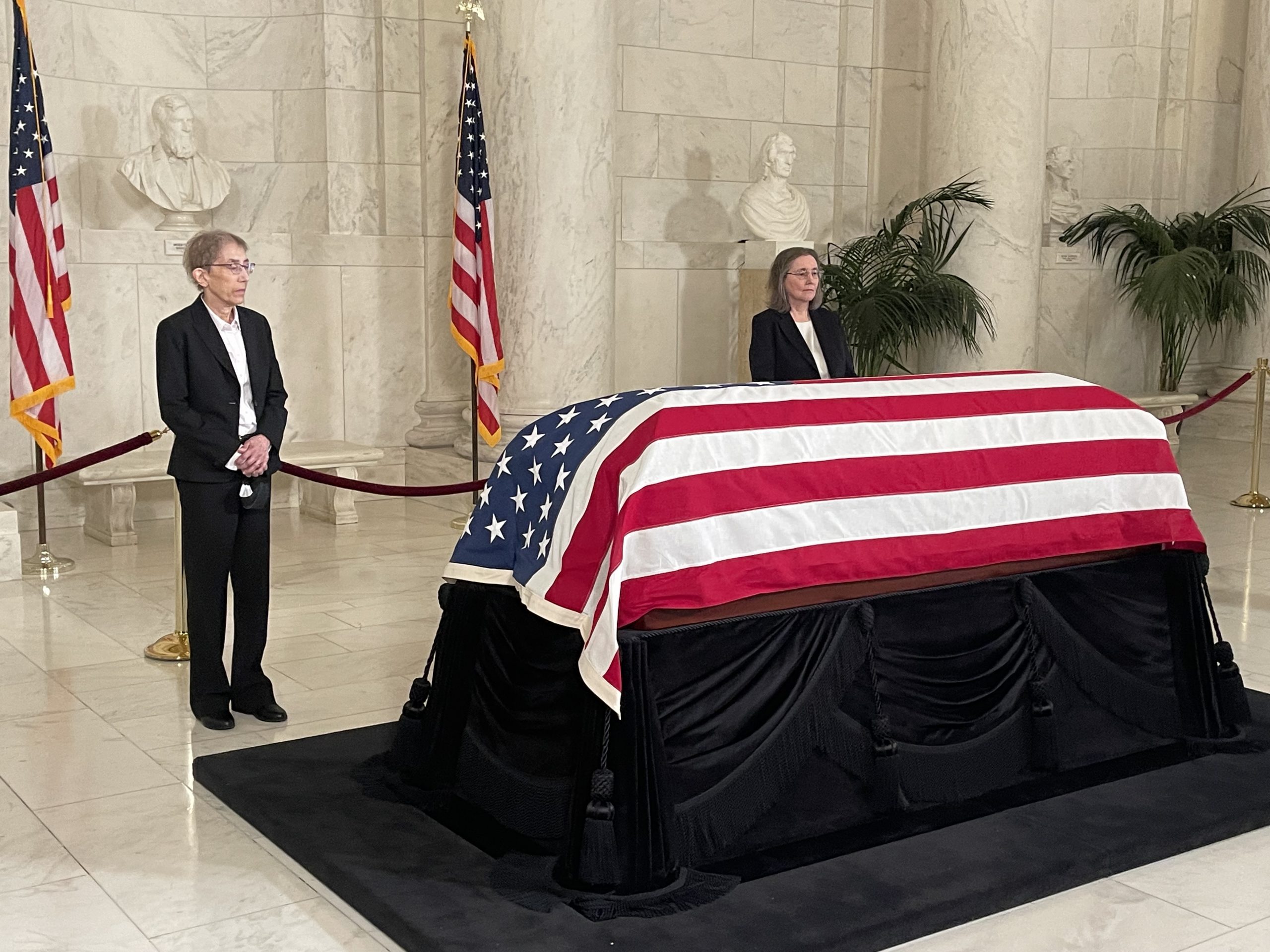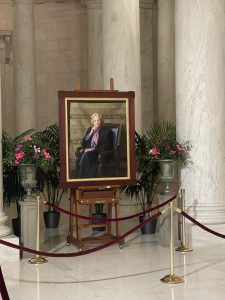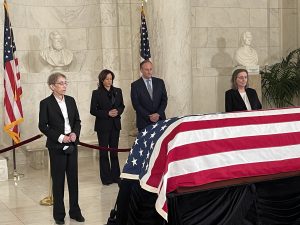[ad_1]
IN MEMORIAM
on Dec 18, 2023
at 1:06 pm

The casket of the late Justice Sandra Day O’Connor in the Great Hall of the Supreme Court (Mark Walsh)
Justice Sandra Day O’Connor returned to Washington to lie in repose in the Great Hall of the U.S. Supreme Court building on Monday, as Justice Sonia Sotomayor lauded O’Connor as “her life role model” and one who was “was devoted to making a better world, and that’s what she did.”
“For many years, the way Sandra went, the court followed, and that was for a simple reason,” Sotomayor said. “Sandra approached each case with incredible thoughtfulness and sought to arrive at a practical conclusion. She never disregarded the realities of our country.”
“The nation was well served by the steady hand and intellect of a justice who never lost sight of how the law affected ordinary people,” Sotomayor said.
O’Connor’s casket was escorted into the court building and onto the Lincoln Catafalque, the platform constructed in 1865 to support the late president’s casket while his body lay in state in the U.S. Capitol, by an honor guard of the Supreme Court police force.
Every sitting member of the court was present for the somber ceremony, as was retired Justice Anthony M. Kennedy. Jane Roberts, Virginia Thomas, and Ashley Kavanaugh were present among the spouses of current justices, while Mary Kennedy, Maureen Scalia (the widow of the late Justice Antonin Scalia), and Cathleen Douglas Stone (the widow of the late Justice William O. Douglas) were also here. Retired Justices Stephen Breyer and David Souter were not present.
Justice O’Connor’s three sons, Scott, Brian, and Jay O’Connor, were present with their wives, and the seven grandchildren of O’Connor and her late husband, John O’Connor, served as honorary pallbearers.
The Rev. Jane Fahey, who served as a law clerk to O’Connor in the 1982-83 term during a 20-year legal career before becoming a Presbyterian minister in the Atlanta area, led the prayers and gave a reminiscence.
O’Connor was “a trusted court colleague, a cherished mentor, a friend, and trailblazing inspiration to many,” Fahey said. “Most of us gathered here were part of her court family. And this space, this building was a kind of holy space for us, the place where we had our most sustained interactions with her.”
Fahey noted the justice’s insistence that her clerks get out of the building to enjoy Washington’s cherry blossoms in the spring, and she described how a forecast of rain did not deter plans for an outdoor picnic.
“Undeterred—indeed thrilled by rain!—and shaped no doubt by her father’s instruction that in ranching life one should be prepared for anything—she simply brought along large umbrellas and oil cloth blankets for our rain-soaked picnic around the tidal basin,” Fahey said.
Fahey said that O’Connor once indulged a clerk’s request to photocopy her hand to make a sign that was posted in her chambers that read, “For a pat on the back, lean here.”

A portrait of the late Justice Sandra Day O’Connor in the Great Hall at the Supreme Court (Mark Walsh)
Fahey added, “She shaped us by her lessons in meaningful work, loving relationship, and zest for life.”
Sotomayor referred to a description of O’Connor by Justice Clarence Thomas, who served 15 1/2 terms with her, as “the glue of this court.”
“I agree,” Sotomayor said. “She brought us all together, even after she retired. The first day I came to work in this building, Sandra was at my office door to welcome me to the court.”
She had revitalized the justices’ practice of eating lunch together after arguments and conferences. “The collegiality of the court, Sandra explained, was vital to getting our work done in a manner the country would respect,” Sotomayor said.
She highlighted some of O’Connor’s extracurricular activities, both during and after her active service, such as pushing for the merit selection of state judges and advancing the rule of law in former Soviet bloc countries. But Sotomayor gave special attention to O’Connor’s devotion to improving civic education. (Sotomayor herself has served on the board of iCivics, the organization founded by O’Connor to create educational games and lesson plans.)
“She saw our nation’s civil discourse breaking down and believed strongly that we would lose our democracy if we did not teach civics to our younger generations,” Sotomayor said. “Sandra famously said, the practice of democracy is not passed down in the gene pool. It must be taught and learned by each generation.”
Sotomayor concluded by pointing out what O’Connor had once told an interviewer she wanted on her tombstone: “Here lies a good judge.”
“Yes, Sandra, you will be remembered that way,” Sotomayor said. “But a full epitaph would read, ‘Here lies a good judge, wife, mother, grandmother, sister, friend, and above all else, a human being, extraordinary.’”
Vice President Kamala Harris and her husband, Doug Emhoff, came to the court to pay their respects a little later on Monday morning, with Harris bowing her head in silent prayer at O’Connor’s casket and then the pair admiring the portrait of O’Connor by Danni Dawson set up on an easel toward the east end of the Great Hall.

Vice President Kamala Harris and her husband, Douglas Emhoff, pay respects to the late Justice Sandra Day O’Connor (Mark Walsh)
With police honor guard members and two former O’Connor clerks at a time standing at attention, members of the public steadily streamed past the casket and portrait as well.
O’Connor will have a private funeral ceremony at Washington’s National Cathedral on Tuesday morning.
[ad_2]



